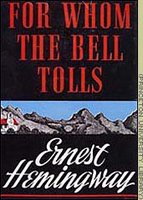For Whom the Bells Toll
 So this summer I've been reading a bunch of books, trying to read a list I've compiled, almost a mile long. One in particular by one of my favorite authors, Ernest Hemingway, For Whom the Bells Toll was quite enjoyable. After an entire semester studying Spanish history and specifically the Guerra civil (civil war) and the Franco era, I appreciated the historical elements of the novel much more. Also many cultural and regional nuggets were disposed throughout the text. But, I think the thing I loved the most about it though was the style that Hemingway writes in. He is a minimalist, but the fact that his main character was in the mountainous Spanish countryside speaking formal Spanish, the fact that Hemingway used choppy phrases and translations that a translator would get fired for, made the language all that more richer as a representation of the Spanish language structure in English.
So this summer I've been reading a bunch of books, trying to read a list I've compiled, almost a mile long. One in particular by one of my favorite authors, Ernest Hemingway, For Whom the Bells Toll was quite enjoyable. After an entire semester studying Spanish history and specifically the Guerra civil (civil war) and the Franco era, I appreciated the historical elements of the novel much more. Also many cultural and regional nuggets were disposed throughout the text. But, I think the thing I loved the most about it though was the style that Hemingway writes in. He is a minimalist, but the fact that his main character was in the mountainous Spanish countryside speaking formal Spanish, the fact that Hemingway used choppy phrases and translations that a translator would get fired for, made the language all that more richer as a representation of the Spanish language structure in English.
An example in case I'm confusing you: Que pasó? in Spanish should be idiomatically translated to what happened? in English. For Whom the Bells Toll would phrase it what passed? How beautiful the language subtleties!
No man is an island, entire of itself;
every man is a piece of the continent,
a part of the main.
If a clod be washed away by the sea,
Europe is the less,
as well as if promontory were,
as well as if a manor of thy friend's or of thine own were.
Any man's death diminishes me,
because I am involved in mankind;
and therefore never send to know for whom the bell tolls;
it tolls for thee.
-Donne




No comments:
Post a Comment